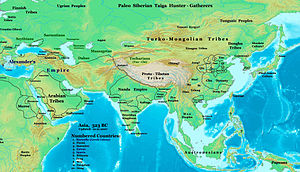Much of the northwestern subcontinent (present day Eastern Afghanistan and Pakistan) came under the rule of the Persian Achaemenid Empire in c. 520 BCE during the reign of Darius the Great, and remained so for two centuries thereafter.[28] In 326 BCE, Alexander the Great conquered Asia Minor and the Achaemenid Empire, reaching the north-west frontiers of the Indian subcontinent. There, he defeated King Puru in the Battle of the Hydaspes (near modern-day Jhelum, Pakistan) and conquered much of the Punjab.[29] Alexander's march East put him in confrontation with the Nanda Empire of Magadha and Gangaridai Empire of Bengal. His army, exhausted and frightened by the prospect of facing larger Indian armies at the Ganges River, mutinied at the Hyphasis (modern Beas) and refused to march further East. Alexander, after the meeting with his officer, Coenus, was convinced that it was better to return.
The Persian and Greek invasions had important repercussions on Indian civilization. The political systems of the Persians was to influence future forms of governance on the subcontinent, including the administration of the Mauryan dynasty. In addition, the region of Gandhara, or present-day eastern Afghanistan and north-west Pakistan, became a melting pot of Indian, Persian, Central Asian and Greek cultures and gave rise to a hybrid culture, Greco-Buddhism, which lasted until the 5th century CE and influenced the artistic development of Mahayana Buddhism.


No comments:
Post a Comment